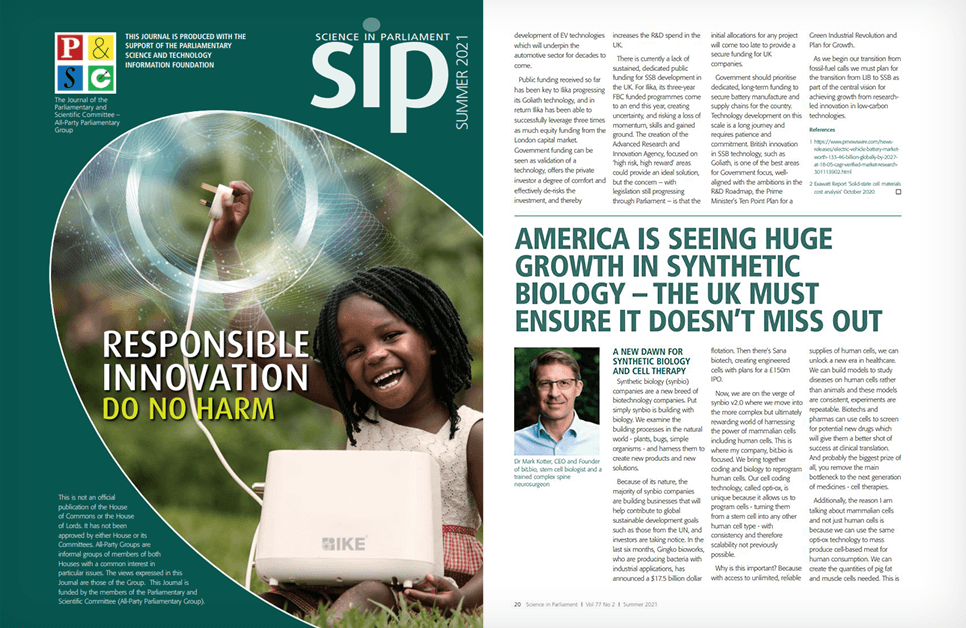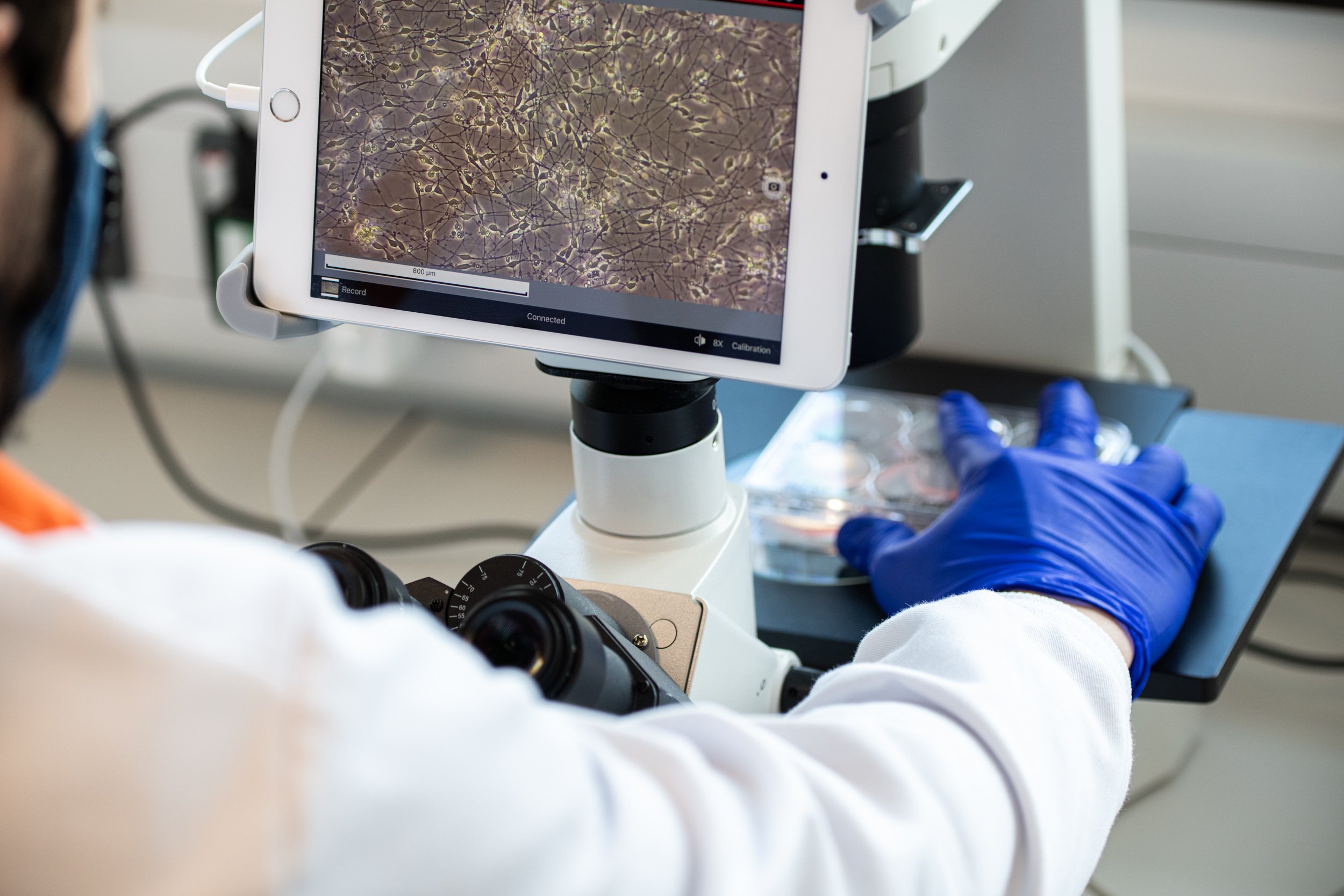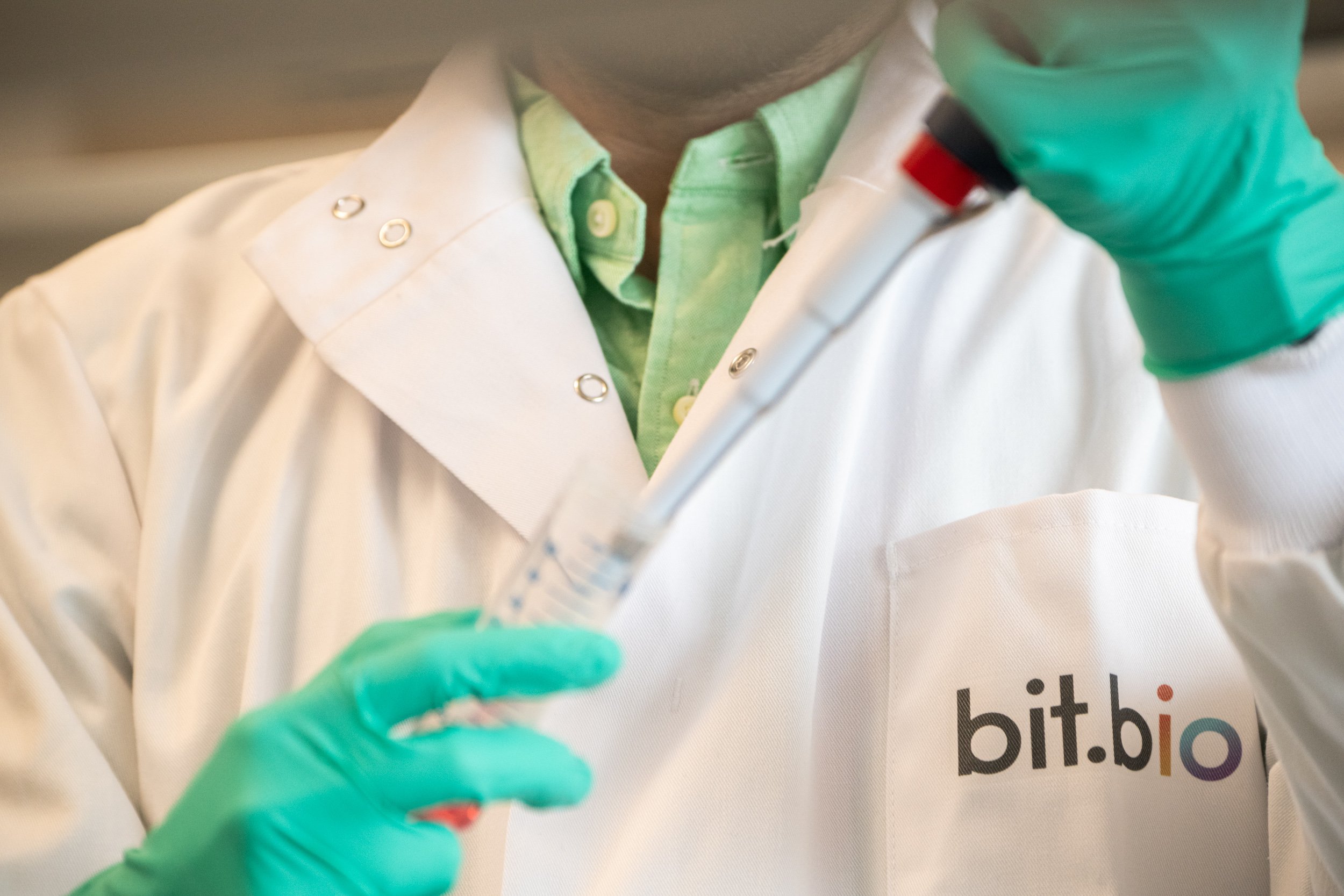25.07.2021 | Published by Science in Parliament

Read the article below from the Summer 2021 issue of Science in Parliament magazine. Authored by our founder and CEO Mark Kotter.
A new dawn for synthetic biology and cell therapy
Synthetic biology (synbio) companies are a new breed of biotechnology companies. Put simply synbio is building with biology. We examine the building processes in the natural world - plants, bugs, simple organisms - and harness them to create new products and new solutions.
Because of its nature, the majority of synbio companies are building businesses that will help contribute to global sustainable development goals such as those from the UN, and investors are taking notice. In the last six months, Gingko bioworks, who are producing bacteria with industrial applications, has announced a $17.5 billion dollar flotation. Then there’s Sana biotech, creating engineered cells with plans for a £150m IPO.
Now, we are on the verge of synbio v2.0 where we move into the more complex but ultimately rewarding world of harnessing the power of mammalian cells including human cells. This is where my company, bit.bio is focused. We bring together coding and biology to reprogram human cells. Our cell coding technology, called opti-ox, is unique because it allows us to program cells - turning them from a stem cell into any other human cell type - with consistency and therefore scalability not previously possible.
Why is this important? Because with access to unlimited, reliable supplies of human cells, we can unlock a new era in healthcare. We can build models to study diseases on human cells rather than animals and these models are consistent, experiments are repeatable. Biotechs and pharmas can use cells to screen for potential new drugs which will give them a better shot of success at clinical translation. And probably the biggest prize of all, you remove the main bottleneck to the next generation of medicines - cell therapies.
Additionally, the reason I am talking about mammalian cells and not just human cells is because we can use the same opti-ox technology to mass produce cell-based meat for human consumption. We can create the quantities of pig fat and muscle cells needed. This is being done by our sister company which I am also a co- founder of, Meatable, based in the Netherlands. So you can see how synbio really could help solve some of the major health issues that our Earth is currently facing, such as changes to healthcare, the ethical challenge of animal slaughter, the industrial use of antibiotics, and, as we have come to painfully realise, the increased chances of high density animal farming to trigger a global pandemic.

Industrial scale supply of human cells
At bit.bio, we represent the coming together of two fields: coding (bit) and biology (bio). Bits are building blocks of code, just as cells are building blocks of life. Together, they illustrate what we do: precise reprogramming of human stem cells. We think about cells like computers, that we can program with code. The DNA is the hard drive (ROM) which stores the operating system, containing all the programs of the cell.
When we talk about coding cells, we are engineering code into this operating system and that code gives the DNA the commands it needs to run specific programs. Why is this important? Because every single human cell type is the result of a unique set of programs running. Control these programs and you can control a cell’s identity with precision. The programs are combinations of different genes, turned up or down to different levels, interacting with one another called gene regulatory networks.
The bit part of our name refers to how we are using machine learning and partnering with the London Institute of Mathematics to hunt for these unique codes for every cell type. The bio is opti-ox - the gene engineering technology that puts the codes into the cell’s DNA and runs them with no interference. The result is batches of human cells at scale with consistency not possible with other reprogramming techniques.
These cells will have an enormous impact across the biotechnology and pharmaceutical sectors, and it will hugely increase the efficiency of drug development and commercialisation – a key aim of the government’s R&D Roadmap. Indeed, bit.bio has a natural alignment with the government’s Plan for Growth and R&D Roadmap, and can contribute to the UK becoming a life sciences superpower as part of a rich and diverse scientific research ecosystem. Our work supports government ambitions for growth by building on the UK’s science base and making real progress in synthetic biology. This is helping to deliver a more efficient and productive R&D ecosystem, and supporting upcoming government strategies to ensure innovation in the UK thrives.
Government plays a leading role
Due to an intensive R&D function, a need to demonstrate clinical proof of concept and to build our product pipeline, synthetic biology scale ups like bit.bio require long term commitment in terms of funding. With this in mind, it is encouraging to see the UK Government recognise the unique growth story of many life science companies by making a number of tailored commitments to the sector. For example, this is evident in Build Back Better: Plan for Growth, the R&D Roadmap, the Life Sciences Industrial Strategy and the Life Sciences Investment Programme.
However, to transform the UK into a life sciences superpower, it requires an investment mindset with a bolder, long term vision for the sector. Synthetic biology in particular represents a huge prospect, with the United States seeing an explosion of investment and companies leveraging the technology. Failure to grasp at this opportunity risks the UK falling behind in an area of science and innovation, already worth billions and anticipated to grow further still. The pandemic has shown that investment in this critical field cannot come soon enough. The UK government is taking steps to ensure there is access to funding, but we must not be complacent.
Synbio needs capital commitment
Like many others in the sector, bit.bio welcomes the UK government’s Life Sciences Industrial Strategy which aims to ensure that the UK is creating a complete ecosystem that will keep us at the forefront of medical research and innovation. The Strategy also identified advanced therapies, including developing advanced therapies and advanced therapies manufacturing, as a key theme.
Establishing government backed growth funds through the British Business Bank and British Patient Capital such as the Future Fund: Breakthrough Capital - a new £375m UK-wide scheme which will encourage private investors to co-invest with government in high-growth, R&D intensive and innovative firms - is a step in the right direction and will help encourage further private sector and VC investment. We will also be watching how the National Security and Investment Act 2021, expected to be commenced towards the end of this year, impacts investment into the life sciences sector. The Act, described by government as the “biggest shake-up of the UK’s investment screening regime in 20 years”, may inadvertently undo some of the good work of previously mentioned schemes.
Under the regime, mandatory notification to the Department for Business, Energy and Industrial Strategy (BEIS) ahead of transactions is required where an investor gains control in an entity in 17 specified “sensitive” sectors – synthetic biology being one of them.
I sympathise with government intentions and a high level of scrutiny on transactions with a national security risk is vital. However, in its initial definition of synthetic biology, the government, according to the BIA, captured most companies in the sector, the vast majority of which will have no implication on national security.
We remain hopeful the government will narrow the definition of synthetic biology further, ahead of secondary legislation being published later this year. BEIS have already shown their willingness to proactively consult with the sector, so an extended line of communication with the BIA and synbio companies can resolve this issue before the regime is implemented later this year.
The UK government has outlined its vision to keep us at the forefront of medical research and innovation, and for the UK to become a life sciences superpower. The desire to reshape the UK’s approach to regulation, detailed in the independent report from the Taskforce on Innovation, Growth and Regulatory Reform, is a welcome next step. In particular, the report's proposal to establish a new UK Clinical Trials Regulatory landscape could move the UK into being a regulatory environment of choice for a clinical study.
bit.bio will continue to contribute to this aim by building on the UK’s world-renowned science base, delivering a revolution in R&D and making real progress in the development of cell therapy through access to unlimited supplies of human cells. This is all within reach and the government of today should be able to look back in ten years time and know they did everything they could to help us
succeed.
“Printed by permission of the Parliamentary & Scientific Committee”.